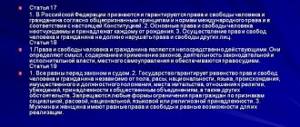Personal and property rights and obligations of spouses
Personal and property rights and obligations of spouses in family law are relationships in which personal interests are affected. It is unacceptable to cancel or limit them even through an agreement. Personal rights for spouses and their general characteristics are established in Article 161 of the RF IC. Moreover, the theses of this article are supplemented by the IC as a whole and the norms of the Civil Code of the Russian Federation. Section 7 of the IC regulates marriage relations between Russians and foreigners and persons without a specific citizenship. Personal and property rights and obligations of spouses - the general characteristics are as follows:
- inseparability from immediate carriers;
- inalienability, even at the will of the individual;
- impossibility of valuation in monetary terms;
- inadmissibility of consideration as the subject of a transaction.
The Family Code of the Russian Federation includes the following types of non-property marital rights:
- The right to independence in choosing professional employment, place of residence and location. Clause 1 of Article 31 of the RF IC establishes that the legal capacity of the spouse is retained in absolute terms, and it cannot be limited by anyone, including when choosing a type of activity. Spouses can live separately; according to Article 20 of the Civil Code of the Russian Federation, the place of residence is considered to be the area where a person lives permanently.
- The right to general resolution of family issues. Clause 2 of Article 31 of the IC determines that spouses solve personal problems of family life together, but the list of significant issues is not defined.
- The right to choose a surname. According to Article 32 of the Family Code, spouses have the right, at their own discretion, to choose whose surname to bear.
Family relationships are quite specific and cannot always be regulated by the state. This determines such a small list of spousal personal rights. The general characteristics of the non-property obligations of spouses under clause 3 of Article 31 of the Insurance Code are as follows:
- build family relationships on mutual respect;
- ensure the well-being and strengthening of the family.
The personal property rights of spouses, which are of secondary importance, include the right to property. These relations can be of both legislative and contractual nature. The property rights and obligations of spouses can be briefly described as follows:
- property assets belonging to spouses before marriage remain their personal property;
- Property acquired during marriage is considered joint, with the exception of items for individual use and property received as an inheritance or as a gift;
- mutual content.
Upon divorce, all common property is divided equally. Each spouse has the right to dispose of their own property at their own discretion.
§ 2. Personal non-property relations of spousesPersonal non-property legal relations of spouses are relations between spouses regarding non-material benefits regulated by legal norms. The list of intangible benefits is contained in Art. 150 Civil Code of the Russian Federation. These include life and health, personal dignity, personal integrity, honor and good name, privacy, personal and family secrets, the right to free movement, choice of place of stay and residence, the right to a name, other personal non-property rights and other intangible benefits. L. O. Krasavchikova divides intangible benefits into two groups: rights that ensure the physical existence of citizens (the right to life, health, a favorable environment, etc.), and rights that ensure the social existence of a person (the right to a name, honor, dignity , personal and family secrets, freedom of movement). Since intangible benefits cannot be measured by economic, physical, or other indicators, therefore, personal non-property relations of spouses have no economic content and are not material in nature. Despite the fact that personal non-property relations are predominant in the family, since they are determined by the very essence of marriage, based, as a rule, on love, mutual understanding and mutual respect, most of them are outside the scope of legal regulation. The personal rights and obligations of spouses are inextricably linked with their personality, and therefore they are inalienable and non-transferable in any way: neither by agreement, nor by universal succession, nor in any other way. The Family Code of the Russian Federation establishes the following personal non-property rights: 1. The right of the spouse to choose his occupation, profession, place of stay and residence. This means that each spouse, guided by his abilities, interests, capabilities and existing knowledge, independently chooses the area of his work and creative activity. The other spouse can only give advice and recommendations on this issue, but his opinion and objections have no legal significance. The right to free choice of place of residence and place of stay means that spouses are not obliged to live together or follow each other when one of the spouses changes their place of residence (for example, in connection with enrollment in a government position or studying in another locality). This also includes the right of the spouse to choose citizenship. The independence of a spouse’s choice of citizenship from the wishes of the other spouse is provided for in Art. 8 of the Federal Law “On Citizenship in the Russian Federation”: the conclusion or dissolution of a marriage between a citizen of the Russian Federation and a person who does not have Russian citizenship does not entail a change in the citizenship of these persons; A change in citizenship by one of the spouses does not entail a change in the citizenship of the other spouse. These rights of each spouse correspond to the obligation of the other spouse not to interfere with the former’s exercise of his personal non-property rights. 2. The right of the spouse to divorce (clause 2 of article 16 of the RF IC). As has been noted more than once, one of the principles of family law is the voluntariness of a marriage union. This means, in particular, the inadmissibility of a forced state of marriage, therefore both spouses have the right to dissolve the marriage at any time. The other spouse has the obligation not to interfere with the exercise of this right (for example, by avoiding a divorce at the registry office, despite the absence of objections to the divorce). 3. The right of a spouse to be appointed as a guardian (trustee) of a child. This right also corresponds to the obligation of the other spouse not to create obstacles in the exercise of this right, since the decision by the guardianship and trusteeship body is made taking into account how the family members of the future guardian (trustee) treat the child (Clause 2 of Article 146 of the RF IC). 4. The right of the spouse to adopt a child. This right corresponds to the obligation of the other spouse not to create obstacles in the exercise of this right (for example, by evading consent (or disagreement) to the adoption of a child). Since the adoption of a child by one of the spouses is possible only with the consent of the other spouse (clause 1 of Article 133 of the RF IC), the latter has a personal non-property right to give such consent or to refuse it. The spouse carrying out the adoption has the obligation not to exert unlawful influence or abuse his other marital rights in order to obtain such consent. 5. The right of spouses to jointly resolve issues of family life: issues of motherhood, fatherhood, upbringing and education of children, distribution of the family budget, acquisition of property and others. In paragraph 3 of Art. 31 of the RF IC also provides for the obligation of spouses to build their relationships in the family on the basis of mutual respect and mutual assistance, to promote the well-being and strengthening of the family, and to take care of the well-being and development of their children. The latter right and obligation are declarative in nature, since the legislation does not provide mechanisms for their enforcement and the possibility of applying sanctions for their violation. After all, if one of the spouses has arrogated to himself the right to resolve issues in family life, then the law does not know an effective way to force the spouses to resolve them together. It is also impossible to oblige a spouse to respect the other spouse, since this relates to the sphere of feelings and may not have an objective expression. If disrespect has received an objective form, then the norms of criminal, and not family law, will be applied. However, in some cases, violation of such rights and failure to comply with responsibilities can have a negative impact on the violating spouse. So, according to Art. 92 of the RF IC, in the event of unworthy behavior in the family of a disabled spouse in need of help, the court may release the other spouse from the obligation to support him. Another personal non-property right of spouses is the right to choose a surname upon marriage and divorce. Each spouse decides for himself what surname he (she) should have, regardless of the consent of the other spouse or third parties (for example, his parents or other relatives). The other spouse has the obligation not to exert unlawful influence and not to abuse his other rights in order to obtain the desired decision. When entering into marriage, spouses choose a common surname at their own discretion, or each spouse retains their premarital surname. The surname of one of the spouses or, unless otherwise provided by the law of a subject of the Russian Federation, a surname formed by joining the wife’s surname to the husband’s surname can be recorded as the common surname of the spouses. The common surname of the spouses may consist of no more than two surnames, joined by a hyphen when written. In the event of divorce, each spouse has the right to retain the surname that he acquired upon marriage, or to restore his premarital surname, regardless of the consent of the other spouse. A change of surname during a marriage or after its dissolution is carried out in accordance with the general procedure provided for by the Federal Law “On Acts of Civil Status”.
Non-property relations between spouses
All rights and obligations of adults and minor participants in family relationships are ensured by state laws and modern criteria of family law.
Those established by law include personal non-property rights of spouses, such as:
- Free choice of place of stay or permanent residence. It is expressed in the fact that spouses do not necessarily have to live together.
- Choosing a profession or type of occupation.
- Current issues of motherhood, paternity, direction of education and level of education of minor children.
- Choosing a surname when concluding a marriage or its dissolution.
There are no discrepancies in the rights and responsibilities of spouses in the family. When considering any issues, none of them has any advantage.
This type of family relationship between spouses has no economic content, and some of it goes beyond the scope of legal influence.
The basis of non-property relations in an official marriage between spouses is their personal rights and obligations, which are inseparable from their personalities and therefore are not alienated in any case. They cannot be the subjects of transactions concluded at one time or another by spouses. Such rights of spouses are not regulated by marriage contracts and are not terminated by agreement of the parties.
If one of the spouses does not fulfill his duties as a family member and does not care about the well-being and strengthening of the marriage union, no sanctions will be applied against him.
But caring for children, their upbringing and development are the responsibilities of spouses, legally established; neglecting them can be punishable.
Personal non-property relations in the family between spouses differ from other legal relations. But, nevertheless, they are also regulated by the legal mechanism of judicial protection; this possibility is provided for by the current family legislation.
A great achievement in recent years is the inclusion of non-property relations developing between spouses in modern family law. This is the result of the struggle for equality in official marriage. Accepted norms and rules emphasize that in all matters related to the characteristics of family life, the legal acts of each spouse should be considered as having equal legal significance.







